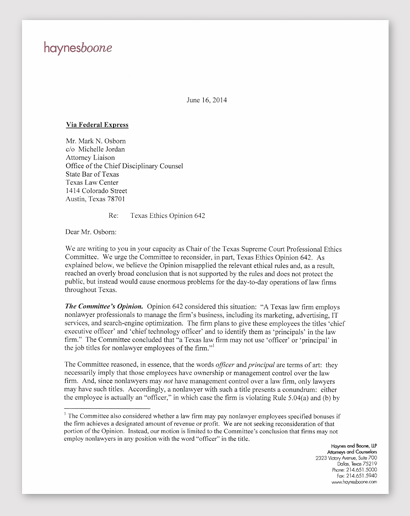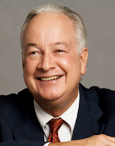© 2014 The Texas Lawbook.
By Mark Curriden – (June 27) – More than 50 law firms have asked the Texas Supreme Court Professional Ethics Committee to reconsider an ethics opinion issued last month that prohibits law firms from identifying non-lawyer employees as “officer” in their title.
The ethics opinion would ban job titles including chief operating officer, chief marketing officer and chief technology officer.
The term “officer,” according to the opinion, “indicates that the person holding the title has the power to control the entire law firm (in the case of chief executive officer) or significant areas of the firm’s operations. (To read the opinion, click here: legalethicstexas.com/Ethics-Resources/Opinions.)
In almost near unison, the law firms decried the decision as ludicrous.
In a letter dated June 16, the general counsel and managing partners of 53 of the state’s largest and most influential law firms say the committee “misapplied the relevant ethical rules” and “reached an overly broad conclusion that is not supported by the rules and does not protect the public.
The six-page letter states that the new opinion would “cause enormous problems for the day-to-day operations of law firms throughout Texas.”

“The committee has ascribed too much significance to the word ‘officer’ and, in the process, has lost sight of the purpose behind these rules,” the letter, authored by Haynes and Boone General Counsel Stacy Brainin, states. “These people may manage important aspects of the firm’s business, but – unless they are also lawyers – they do not own equity in the firm or control how the lawyers conduct their professional activities.”
Brainin writes that the committee “ignored the important distinction between law firm employees who deal with clients and those who work in the back office.
“We are aware of no evidence that the public has ever been misled into believing that the mere use of the word ‘officer’ necessarily connotes ownership or control of the firm’s lawyers,” the letter states. “To the contrary, the public knows full well that Chief Technology Officers, for example, supervise other IT employees of the firm – not the lawyers.”
Other Texas lawyers are more blunt.

“This opinion could limit our ability to hire the right people, which could then adversely impact how we deliver legal services,” says Smith.
Michael Lowenberg, the general counsel of Dallas-based Gardere, says the opinion is “not in the interest of our clients or the public.
“We believe they just got it wrong,” says Lowenberg. “Nobody is going to think that our chief technology officer is a lawyer or that he’s out there giving legal advice.

Several professional organizations, including the Association of Legal Administrators, the International Legal Technology Associates, the Legal Marketing Association and the American Association of Law Libraries, also sent a letter dated June 16 to the committee asking it to rescind the ethics opinion.
Mark Osborn, a partner at Kemp Smith in El Paso and chairman of the nine-member Professional Ethics Committee, confirmed that he has received the letters.
“The committee is going to consider them at our next meeting, probably in the fall,” says Osborn. “We receive letters from Texas lawyers asking questions and we try to answer those questions in order to give guidance.”
Osborn says he cannot comment on the specifics of the opinion.
© 2014 The Texas Lawbook. Content of The Texas Lawbook is controlled and protected by specific licensing agreements with our subscribers and under federal copyright laws. Any distribution of this content without the consent of The Texas Lawbook is prohibited.
If you see any inaccuracy in any article in The Texas Lawbook, please contact us. Our goal is content that is 100% true and accurate. Thank you.
